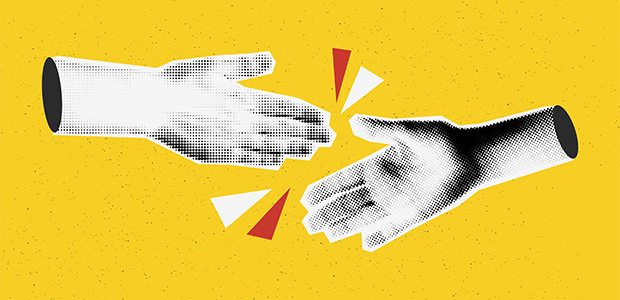
Why dealmakers need to play the long game
It’s been a bruising few years for the global dealmaking market. Between trade wars, political upheaval, and ongoing economic turbulence, businesses have faced strong headwinds in the past five years, and the economic forecast isn’t looking much calmer.
For many founders and dealmakers alike, it might seem like a time to retreat and wait for calmer waters before making bold moves. As someone who ran a successful headhunting business during the 2008 economic crash, I’ve learned that the businesses that prosper aren’t the ones that wait for stability, but those that learn to thrive through volatility.
What we’re seeing now isn’t the end of the deal cycle. It’s a reset. The fundamentals of dealmaking haven’t changed, but the mindset required to succeed has. And that’s where founders, particularly those scaling fast, can learn something vital.
In today’s deal environment, resilience and long-term focus translate into tangible advantages – sustained deal flow, sharper valuations, and the ability to execute when competitors hesitate.
Resisting the knee-jerk reaction
When uncertainty hits, the natural instinct is to hunker down, freeze hiring, delay investment, and conserve cash. While caution is sensible, paralysis is not – and businesses often forget that it’s possible to be prudent without being stagnant.
I’ve seen too many businesses lose momentum because they overreacted to short-term noise. Founders must learn to differentiate between what’s truly structural, changes that alter the long-term trajectory of your market, and what’s cyclical, which will pass with time.
Instead of overcorrecting, use this situation to assess your positioning. Are you clear on your value proposition? Are you building the right partnerships? Are you strengthening the foundations that will let you move fast when confidence returns?
When headlines scream “crash,” many will instinctively retreat. But in global dealmaking, a sharper move is to lean in with clarity of purpose. Take private equity during the 2008 financial crisis, for example: numerous studies show that PE-backed companies cut investment less than their peers and, in many cases, actually expanded market share during the turmoil.
Rather than wait for “all clear,” firms with access to capital and conviction doubled down. They provided equity injections to portfolio companies, renegotiated debt, and pushed ahead with operational improvements. Focus beats fear: the businesses that come out stronger are the ones that stay laser-focused on their value creation engines.
Owning your niche
In a crowded and cautious market, focus becomes your greatest asset. The temptation to diversify too early or chase every opportunity is strong, particularly when growth feels uncertain. Startups often think agility means constant pivoting. In truth, agility and consistency must coexist. The best founders know when to flex and when to hold their nerve.
When GLAS entered the debt administration space, it was a market dominated by large banks, and we needed to prove our value. Market parity was never our goal. Instead, we set ourselves apart by always saying yes – no matter the type of deal, complexity or size, we made a commitment to figure it out. This ability to problem solve has helped us futureproof the business – GLAS doesn’t change, but the problems it solves do.
That same principle applies today to any founder. Whether you’re a fintech, a food brand, or a data platform, owning your niche isn’t about limiting yourself; it’s about building credibility, resilience, and recognition in a space where you can genuinely lead.
The power of patience
In a market that rewards speed, patience sounds counterintuitive. But patience doesn’t mean lack of action, and growth rarely happens overnight. I had to hold more than 400 business meetings before securing my first deal. It was exhausting, yes, but it taught me one of the most valuable lessons in business: persistence gets results.
Another example is the global M&A rebound in the energy transition sector over the past year. Despite rising interest rates and regulatory uncertainty, companies like Brookfield and BlackRock continued to pursue multi-billion-dollar acquisitions in renewables and clean infrastructure throughout 2023 and 2024.
While others paused, these firms re-evaluated their long-term strategies, doubled down on sectors aligned with structural change, and secured assets at more attractive valuations. They weren’t waiting for the storm to pass; they reshaped their portfolios to thrive in the new climate.
Markets recover. Investor confidence returns. What matters is being ready when they do, with a solid business plan, a trusted reputation, and a team that’s built to last.
A call for calm confidence
There’s no denying that the global deal landscape will remain unpredictable. But that doesn’t mean founders should shy away from it. If anything, now is the time to sharpen strategy, strengthen relationships, and stay disciplined.
The same principles that underpin successful dealmaking, preparation, patience, and perspective, apply just as much to building and scaling a business.
Too many founders are still asking themselves, “what if things calm down?” or “how do we just get through this?” It’s ok to not have all the answers, and the right partners can support you. However, the truth is, this isn’t a storm to wait out; it’s a new climate to operate in.
The founders who will succeed aren’t those clinging to the old playbook, but those rethinking their business models, recalibrating expectations, and adapting their strategy to thrive in a tougher, more disciplined market.
Turbulence is inevitable, but decline isn’t. Founders who learn to see disruption not as danger but as opportunity will not only survive this cycle, but define the next one.
For more startup news, check out the other articles on the website, and subscribe to the magazine for free. Listen to The Cereal Entrepreneur podcast for more interviews with entrepreneurs and big-hitters in the startup ecosystem.

